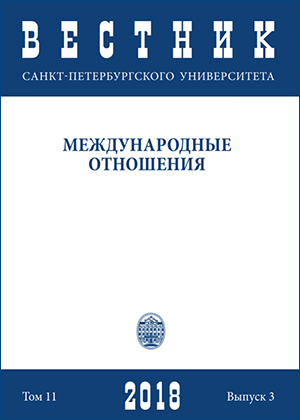Государства выбирают стратегию поведения
DOI:
https://doi.org/10.21638/11701/spbu06.2018.308Скачивания
Библиографические ссылки
Черкассов П.П. ИМЭМО: Портрет на фоне эпохи. М.: Весь мир, 2004. 572 c.
Хрусталев М. Две ветви ТМО в России // Международные процессы. 2006. № 11. С 119–128.
Богатуров А. Десять лет парадигмы освоения // Pro et Contra. 2000. T. 5, № 1. С. 195–201.
Морозов В.Е. Вездесущая идентичность: российская политическая наука перед лицом западной гегемонии // Общественные науки и современность. 2011. № 3. С. 62–72.
Waltz K. Theory of International Politics. Longrove, Ill: Waveland Press, 2010. 252 p.
Schweller R.L. Unanswered Threats: Political Constraints on the Balance of Power. Princeton: Princeton University Press, 2006. 200 p.
Axelrod R., Keohane R.O. Achieving Cooperation Under Anarchy: Strategies and Institutions // David A.Baldwin (ed.) Neorealism and Neoliberalism: The Contemporary Debate. New York: Columbia University Press, 1993. P. 85–115.
Wendt A. Anarchy is what States Make of it: The Social Construction of Power Politics // International Organization. 1992. Vol. 46, N 2. Spring. P. 391–425.
Finnemore M. National Interests in International Society. Ithaca: Cornell University Press, 1996. 154 p.
Smith S. Theories of Foreign Policy: An Historical Overview // Review of International Studies. 1986. Vol. 12, N 1. Jan. P. 13–29.
Snyder R.C., Bruck H.W., Sapin B. (eds.) Foreign Policy Decision Making: An Approach to the Study of International Politics. New York: Free Press, 1962. 274 p.
Rosenau J.N. Comparative Foreign Policy: Fad, Fantasy, or Field? // International Studies Quarterly. 1968. Vol. 12, N 3. Sept. P. 296–329.
Allison G.T. Essence of Decision: Explaining the Cuban Missile Crisis. Boston: Little, Brown, 1971. 338 p.
Janis I. Victims of Groupthink. Boston: Houghton Mifflin, 1972. 277 p.
Steinbruner J. The Cybernetic Theory of Decision: New Dimensions of Political Analysis. Princeton: Princeton University Press, 2002. 392 p.
Putnam R.D. Diplomacy and Domestic Politics: The Logic of Two-Level Games // International Organization. 1988. Vol. 42, N 3. Summer. P. 427–460.
Schelling T.C. The Strategy of Conflict. Cambridge, MA: Harvard University Press, 1980. 309 p.
Simon H.A. Human Nature in Politics: The Dialogue of Psychology with Political Science // American Political Science Review. 1984. Vol. 79. P. 293–304.
Monroe K.R. Paradigm Shift: From Rational Choice to Perspective // International Political Science Review. 2001. Vol 22, N 2. P. 151–172.
Nye J. S. Collective Economic Security // International Affairs. 1974. Vol. 50, N 4. Oct. P. 584–598.
Хрусталев М.А. Анализ международных ситуаций и политическая экспертиза. М.: Аспект пресс, 2018. 224 с.
Holsti K.J. International Politics: A Framework for Analysis. 7th ed. Englewood Cliffs: Prentice Hall International, Inc., 1995. 399 p.
References
Cherkassov P.P. IMEMO: Portret na fone epokhi [IMEMO: Portrait on the background of the era]. Moscow, Ves’ mir Publ., 2004. 572 p. (In Russian)
Khrustalev M. Dve vetvi TMO v Rossii [Two branches of IRT in Russia]. Mezhdunarodnye process, 2006, no. 11, pp. 119–128. (In Russian)
Bogaturov A. Desiat’ let paradigmy osvoeniia [Ten years of development paradigm]. Pro et Contra, 2000, vol. 5, no. 1, pp. 195–201. (In Russian)
Morozov V.E. Vezdesushchaia identichnost’: rossiiskaia politicheskaia nauka pered litsom zapadnoi gegemonii [Omnipresent identity: Russian political science facing Western hegemony]. Obshchestvennye nauki i sovremennost’, 2011, no. 3, pp. 62–72. (In Russian)
Waltz K. Theory of International Politics. Longrove, Illinois, Waveland Press, 2010. 252 p.
Schweller R.L. Unanswered Threats: Political Constraints on the Balance of Power. Princeton, Princeton University Press, 2006. 200 p.
Axelrod R. and Keohane R.O. Achieving Cooperation Under Anarchy: Strategies and Institutions. David A.Baldwin (ed.). Neorealism and Neoliberalism: The Contemporary Debate. New York, Columbia University Press, 1993. 375 p.
Wendt A. Anarchy is what States Make of it: The Social Construction of Power Politics. International Organization, 1992, vol. 46, no. 2, Spring, pp. 391–425.
Finnemore M. National Interests in International Society. Ithaca, Cornell University Press, 1996. 154 p.
Smith S. Theories of Foreign Policy: An Historical Overview. Review of International Studies, 1986, vol. 12, no. 1, Jan., pp. 13–29.
Snyder R.C., Bruck H.W. and Sapin B. (eds.). Foreign Policy Decision Making: An Approach to the Study of International Politics. New York, Free Press, 1962. 274 p.
Rosenau J.N. Comparative Foreign Policy: Fad, Fantasy, or Field? International Studies Quarterly, 1968, vol. 12, no. 3, Sep., pp. 296–329.
Allison G.T. Essence of Decision: Explaining the Cuban Missile Crisis. Boston, Little, Brown, 1971. 338 p.
Janis I. Victims of Groupthink. Boston, Houghton Mifflin, 1972. 277 p.
Steinbruner J. The Cybernetic Theory of Decision: New Dimensions of Political Analysis. Princeton, Princeton University Press, 2002. 392 p.
Putnam R.D. Diplomacy and Domestic Politics: The Logic of Two-Level Games. International Organization, 1988, vol. 42, no. 3., Summer, pp. 427–460.
Schelling T.C. The Strategy of Conflict. Cambridge, MA, Harvard University Press, 1980. 309 p.
Simon H.A. Human Nature in Politics: The Dialogue of Psychology with Political Science. American Political Science Review, 1984, vol. 79, pp. 293–304.
Monroe K.R. Paradigm Shift: From Rational Choice to Perspective. International Political Science Review, 2001, vol. 22, no. 2, pp. 151–172.
Nye J. S. Collective Economic Security. International Affairs, 1974, vol. 50, no. 4, Oct., pp. 584–598.
Khrustalev M.A. Analiz mezhdunarodnykh situatsii i politicheskaia ekspertiza [Analysis of international situation and political expertise]. Мoscow, Aspekt press, 2018. 224 p. (In Russian)
Holsti K.J. International Politics: A Framework for Analysis. 7th ed. Englewood Cliffs, Prentice Hall International, Inc., 1995. 399 p.
Загрузки
Опубликован
Как цитировать
Выпуск
Раздел
Лицензия
Статьи журнала «Вестник Санкт-Петербургского университета. Международные отношения» находятся в открытом доступе и распространяются в соответствии с условиями Лицензионного Договора с Санкт-Петербургским государственным университетом, который бесплатно предоставляет авторам неограниченное распространение и самостоятельное архивирование.




